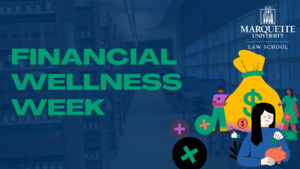The Office of Student Affairs Presents Financial Wellness Week
By Sarah DiStefano and Anna Fodor
This is the eighth in a series of weekly blog posts about the work of Marquette Law School’s Office of Student Affairs. Scroll to the bottom for links to the previous posts from this series.
 It’s no secret that law school is a very big investment—of time, effort, and yes, money. We clearly believe that the investment is worthwhile, otherwise we couldn’t in good conscience do what we do (that is, work to support students as they pursue their legal education). Like any large investment, this one also requires attention and care.
It’s no secret that law school is a very big investment—of time, effort, and yes, money. We clearly believe that the investment is worthwhile, otherwise we couldn’t in good conscience do what we do (that is, work to support students as they pursue their legal education). Like any large investment, this one also requires attention and care.
Yet for any number of reasons—whether it’s because we already have too much to worry about, we were taught not to discuss it, or it’s just easier to think of as a “tomorrow” problem—talking and thinking about finances, our student loans, and our potential earnings can be quite difficult.
We recognize both the importance and the difficulty involved, and so the Office of Student Affairs works to promote financial-education resources and services designed specifically for law students.
The Law School partners with the AccessLex Institute, a nonprofit organization, to provide our students free access to financial education resources through the MAX program. Students receive information about how to register for the MAX program as early as the summer before law school begins (Pre-Orientation) and can take advantage of the webinars, free advising from an accredited financial counselor, and scholarship opportunities at any point throughout their law school careers.
We also have impressive partners throughout campus, including the financial aid counselors and loan advisors who work with our students (not to mention, faculty and staff, as well) concerning short-term financial needs and to design savvy long-term loan repayment plans based on individual circumstances.
These efforts culminate in our annual Financial Wellness Week programming. Why call it financial “wellness”? Is it another way to incorporate an of-the-moment buzzword into our programming? Well, sure. But, primarily, it’s a recognition of the fact that taking control of our finances now can allow us to feel less anxious about our path ahead.
Ultimately, it steadies us to get a handle on our individual financial situation, to learn and implement smart money habits, and to create achievable financial goals. We believe that addressing these matters openly and without judgment is part of our mission to care for the whole person.
But let’s be clear, though we might know our way around a student loan or five, we are not, ourselves, financial experts. Luckily, we know some people who are, and we’re proud to feature them in this year’s Financial Wellness Week programming. Our sessions include the following:
Planning Ahead: Student Loan Repayment Info Session
Tuesday, March 26, at noon
Please join Senior Loan Account Advisor Michael Tindall from the Marquette University Bursar’s Office, for an overview of the entire process of managing many types of student loans, including the various repayment options available to recent graduates and effective strategies for managing debt and finances after graduation. This session is open to all students and will be especially useful for graduating 3Ls.
Tax Savvy Students: Maximizing Tax Savings & Minimizing Stress
Wednesday, March 27, at noon
April 15 is just around the corner. Attend this session to hear from our very own tax expert, Associate Dean Vada Lindsey, as she discusses her experience with tax preparation and how she ensures that tax season goes smoothly and with minimal stress. Learn why it’s still important to file a tax return even when not required by law to file it. Dean Lindsey will also share her insight into how students might maximize tax savings that will benefit them for many years to come.
Dollars and Cents of Working in Public Interest
Thursday, March 28, at 12:15 p.m.
Considering a post-graduate career in public interest law? Not sure how to manage salary expectations and student-loan repayments? Want to learn how one lawyer eliminated significant student-loan debt, working in public service for ten years? Join the Office of Student Affairs and the Office of Public Service as we host Attorney Karen Bauer to speak on her experiences working in public interest and managing student loan repayment, loan forgiveness, and more. To kick off the event, attendees will learn more about the Howard and Phyllis Eisenberg Loan Repayment Assistance Program (LRAP).
We hope our students find these sessions helpful and can take advantage of the resources available to them. We talk a lot about wellness in the legal profession. For it to be a full and honest conversation, it needs to include financial wellness.
Previous posts in this series:
- Some Glimpses into the Law School Office of Student Affairs by Joseph D. Kearney
- What We Hear by Anna Fodor
- Law School Alphabet Soup by Anna Fodor
- By the Students, For the Students by Sarah DiStefano
- The Students behind the Marquette Law Mentorship Program by Joseph D. Kearney
- We All Work in Student Affairs by Anna Fodor
- Tips from a Law School Registrar by Nicole Toerpe Mason
